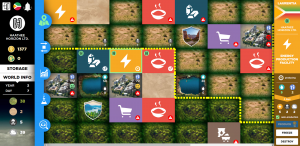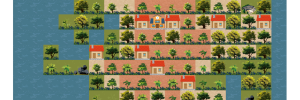Pablo Suarez, Associate Director for Research and Innovation of Red Cross/Red Crescent Climate Centre, created many interesting games revolving around climate, risk and its impact on everyday reality.
Pablo Suarez on Climate Risk Management game:
Pablo Suarez explains why Red Cross/Red Crescent Climate Centre decided to spread climate awareness throughout the world:
The game is a system, a system where you make a decision, and your decisions have consequences. And your consequences will depend on how smart you were processing information. And also, a little bit how lucky you are.
A game as a simplified version of reality can serve as a tool to examine many real life events. Especially the most extreme ones.
For example, in Dissolving Disasters players experience changing weather conditions and what results of those changes bring to their live and wallet. In different game – Paying for Predictions, players must face changing risk and “pay for their predictions”.
How to calculate the risk?:
But according to Pablo Suarez, training in decision-making is not enough:
We need to think collectively – humanitarian sector, climate experts, governments, donors, communities at risk, farmers organisations – everyone. There needs to be dialogue, policy dialogue of how are we going to deal with changing possibilities if some bunch of scientist tell us the chances of the flood this season is probably 50 or 60%. But for a farmer, for a Red Cross worker, for a government, for a donor, it’s looks like a normal day.
That is why most of the games presented by RC/RCCC incorporate elements of cooperation and collaborative planning. Players decide what actions will be the best not only for them but also for the community they belong to.
The games Pablo Suarez co-designed point out other problems like gender equality (in Climate and Gender game), and, furthermore, can be used in different environments.





